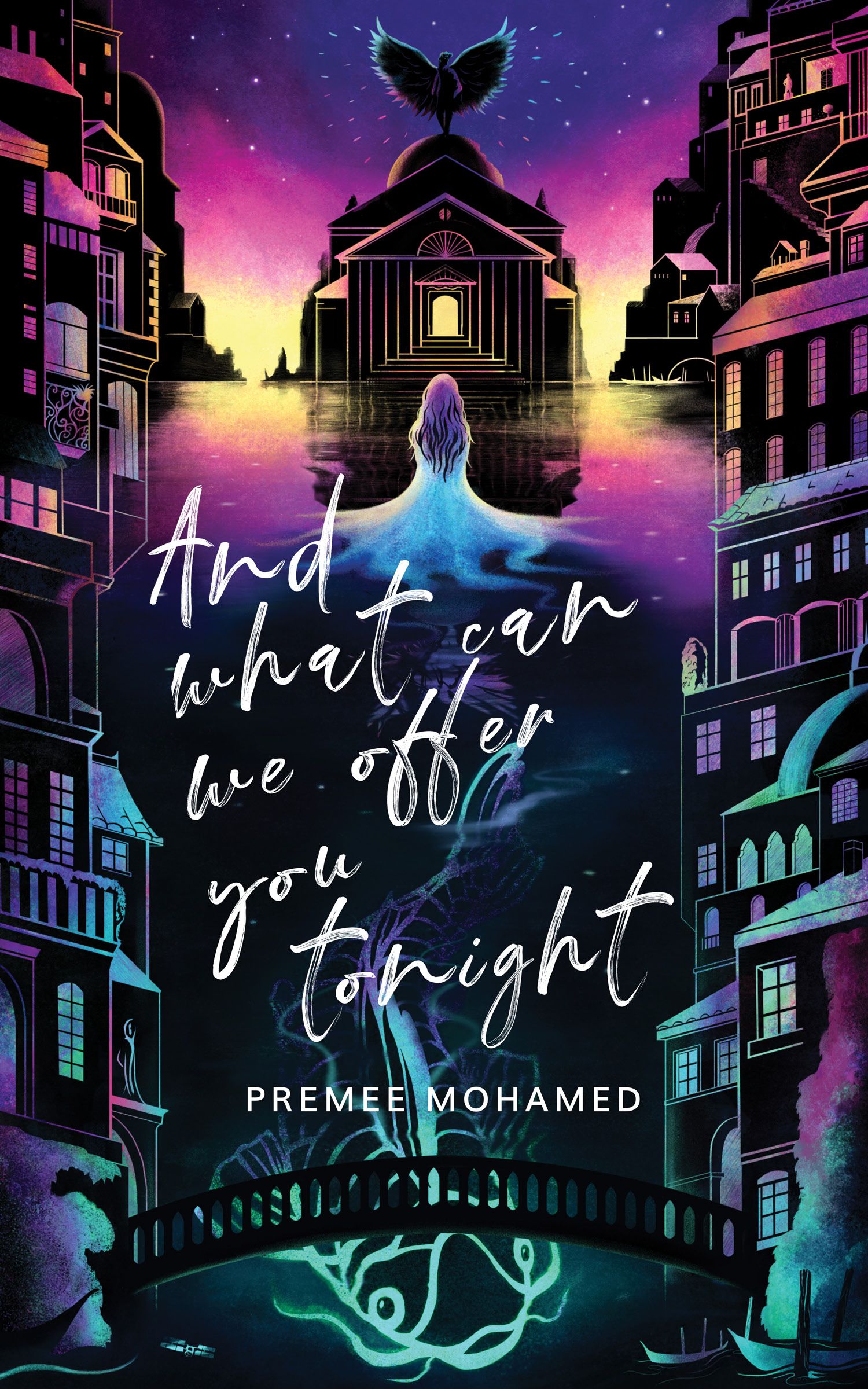Exclusive Preview: And What Can We Offer You Tonight

A stunning cover and a gripping excerpt from Premee Mohamed's upcoming novella
In a far future city, where you can fall to a government cull for a single mistake, And What Can We Offer You Tonight tells the story of Jewel, established courtesan in a luxurious House. Jewel’s world is shaken when her friend Winfield is murdered by a client, but somehow comes back to life. To get revenge, Jewel and Winfield will both have to confront the limits of loyalty, guilt, and justice.
Premee Mohamed's upcoming novella will be released on July 20, 2021. And What Can We Offer You Tonight promises to be a truly captivating read according to dave ring, Managing Editor and Publisher at Neon Hemlock Press:
When I was reading novella submissions for Neon Hemlock's 2021 Novella series, the voice of Jewel in And What Can We Offer You Tonight caught me off-guard. She's breathless and funny, harrowing and bold. I began the story somewhat intrigued, but finished it terminally covetous. I needed to publish this novella. In some ways, it reads like a book-length version of one of those Victorian chapter headings — the sort that go Wherein We Went to the Market and Terrible Decisions Were Made — except set in a dystopian future amidst the excesses of capitalism, with a side order of inexplicable resurrection. I think And What Can We Offer You Tonight will resonate with anyone who's ever been up against something impossibly big, impossibly awful, and had to fight back, despite what your common sense told you was right to do.

Premee Mohamed is an Indo-Caribbean scientist and speculative fiction author based in Edmonton, Alberta. She was a Capital City Press Featured Writer for 2019/2020 with the Edmonton Public Library. Her debut novel, Beneath the Rising, was published in 2020 by Solaris Books, and was a finalist for the 2020 Crawford Award. The sequel, A Broken Darkness, came out in March 2021. In 2017 she was nominated for the Pushcart Prize for her story 'Willing' (Third Flatiron Press). She is represented by Michael Curry of the Donald Maass Literary Agency. She can be found on Twitter and Instagram at @premeesaurus and on her website at www.premeemohamed.com.
With a stunning, evocative cover by illustrator Carly A-F, And What Can We Offer You Tonight is just as vibrant on the outside as it promises to be on the inside. Read on for an exclusive excerpt from what has quickly become one of my most-anticipated upcoming novellas, courtesy of Neon Hemlock Press – and don't forget to pre-order here.

I.
The dead girl woke and asked for her perfume and we gave it to her and she slept again.
And when she did so I felt glad I had not let anyone rifle through her things as often happened before the funeral. Someone might have been wearing her scent at the ceremony but no one was.
So now she lies on my bed with her bluewhite hand curled around the glowing vial. The one thing she wanted.
Nero sniffs, leans a shoulder gingerly against the doorway, avoiding his newly-implanted wings. "They do that with dinoflagellates, you know. It's nothing special."
"Don't be jealous," I tell him. Of course he cannot help it, he is very young, and anyway we are all of us a little rattled right now, I would say that none of us are really acting like ourselves, not really.
Someone needs to tell, someone whispers just outside the cracked door of my room, and someone whispers back Shhh! What is wrong with you? and someone else adds What the fuck is wrong with you?
For now I think the secret is safe. But the owners of our House will find out at some point. Not from me and not from my fellow courtesans, and need has nothing to do with what we do anyway. Does it. Ever. Has it. Ever.
Nero gets up to stand watch in the hallway and that leaves me in here with the dead girl who is not dead.
II.
This morning we crept out to the abandoned church, a dignified flotilla, ten and twenty and thirty and at the last perhaps forty boats bobbing in the dark with our red lanterns, and for a moment it was pretty and calm, Nero smiling for the first time in days, balancing lightly in the prow and holding up his light like a statue, and Sit down, sit down, fool, the hisses from the back, the others disliking the rocking on the flat oily water, and then the church loomed ahead, a grand jagged ruin bleeding rust into the slowlapping sea.
We made mooring on silken ribbons and entrusted the boats to the god of the beautiful dead. The steps have been vanishing year by year but we still splashed up the last few and passed through the great doors and down the aisle, the coffin already waiting on the altar. And inside some of us walked and some of us paddled, not thrashing or kicking overmuch, so that the sound of the sea could enter also.
Our church has been our church for generations. No one knows how it all began: this dark procession, the laying out of the body. It occurred to me that these things—to prepare the dead, to gather in the act of mourning—are among the hardest to shift in a people. That they move slowly and stubbornly, and that people cling to the practices they know for centuries, millennia, through famine, war, assimilation, invasion, colonization, plague, decline, despair.
What cataclysm drove us to this broken place? Was it whole then? I feel certain it wasn't. Our rituals are too set in stone.
Cemeteries in the city have been mostly built over, the standard practice and the standard process: leveling, compaction, low areas filled with waste, high areas brought low. The few left are guarded like prisons, and only for the use of the very rich.
No one says anything about that, no one ordinary, everyone just puts their dead into a canal. Lots of those around. Free, too. Once, I know, there was an idea of eternal life, or life after death, but everyone has abandoned that idea except them, the rich I mean, who are like another species.
We have not even given our god a name. Maybe in another thousand years.
On the thick particleboard of the coffin we placed flowers, and on the damp and crawling walls we hung the necessary artifacts, each giving as tradition specified: something about the deceased, but also something of ourselves. A single earring, rendering its mate back at the house useless; one glove; a painting or a scrap of sheetmusic; a lock of hair; a prized lipstick. To represent her finest skills, those of which she was most proud, some illustrated the walls in grease-pencil, or tacked up the packaging of toys or whips, hoarded specially for memorials and set aside for these days.
And the priest did not bid us be quiet, because we are told to be quiet often enough. And he also gave us no name for that reason, because it is only in mourning that we use the names we like instead of the names we were given when we were purchased. Each part of the ritual has a purpose and each successful step has a consequence for the dead. So for duty's sake we played the game as it was necessary to be played and the priest blessed the final piece and placed it on the flat glossy lid of the coffin.
It was nearly sunrise, the funerals always happen at sunrise, that too is our tradition. Someone once said: Yes, now, when we are set free, like fairies in a story, from our bondage, and fly the wide woods... but that itself is a fairy story. We are still bound. This place is the only one we can visit, and the owners of the House look away from our transgression like they look away from death, and the sky is blueblack as a bruise and the water is the same and between them, very often, is a single knife-thin slice of gold sun more beautiful than any metal and any gem at House of Bicchieri and more beautiful than any of us and more beautiful than any of our clients.
And one of the new girls was crying and disoriented, she had been sick on the boat; and luckily her dress was still clean, because we must present ourselves in the church as clean and proud. But she said, This isn't how funerals go, this isn't how they go, and someone questioned her, and was stunned to discover that she had attended one as a little girl; and I too was stunned. Till I began at the House I had never heard of a funeral. I repeat: you paid your respects to the family and you gave a few credits if you had them, and then the body was weighted and sunk in the closest canal.
Instead this girl crying, saying this was not what she remembered. Her family must have been wealthy. I wondered how she had come to the House. Not something we ever ask, that's the rule; that information is only offered freely, and only to friends. For you don't climb to us. You fall only, you don't climb. She had fallen, or been thrown. Now she would never rise again. A long sad time, never.
Someone comforted her, and we clambered upon the rounded backs of the pews to begin the last of the rites. Someone passed around a bag of sweets. Someone passed around a flask of liquor. Wrists rose pale in the darkness and were blessed with a dab of scent. We were defiant, we were dressed for no client, scented for no client, we had lit up our implants and fed our hair for no client. Only to honour the dead girl, who we all loved.
And the priest said, Blessed are the bodies, and we said, Whose bodies. And he said, Yours. Yours. And the girl who had been crying looked up all surprised and dried her face and recomposed herself.
Good girl. You fell far, I wanted to tell her, but you have fallen into our arms, and we will carry you as best we can. Hence this secret ceremony, hence the priest we pay from our own earnings, hence the boats, the finery, the coffin itself. The House will not let us have this and the city will not let us have this but have this we must for those very reasons.
In the distance small red lights, looping regular patterns like the flight of a moth, a govvy cull in the Lows. Popular neighbourhood for it. They can get their quota in a day or two, and laze around the rest of the month. A curse upon their name, a pox upon them, we could not be touched by a cull, the House made us safe, but all of us had left someone behind. May they sicken and die. May they go unremembered.
And the priest said, This, your friend Winfield, and at hearing her name she stirred and sat up and pushed open the coffin and flowers spilled off her like water, roses, jasmine, lilies, honeysuckle, and the ugly rip they had made to fake an 'autopsy' tore open its lazy stitches and filled with blossoms.
No one screamed but we are trained to control our screams and in looking back actually I was very proud at our silence, which was stunned but absolute.
And she tried to get out of the coffin but could not. The priest fainted. We climbed from the pews and propped him up out of the water and took her home.
III.
Give her to me, I said then, and because I have been in the House for so long, because I am nearly thirty years old, they obeyed me. Or obeyed my seniority at any rate. Before the ceremony I hissed and whisked people away from her room; now I probably will not need to. Even those who did not attend and do not know what to fear will have the vague knowledge that if the road to mortality runs two ways now, that if she is not alive, and she is not dead, her room is certainly filled with numinous spirits.
I asked for her without a plan in mind but we'd better do something. Demand is high to get in the House of Bicchieri, maybe the highest in all of the city, and the owners will not let the room languish without an occupant for long; it's not making a profit while it's empty of a warm and willing body.
I leave Winfield on top of the silkstitched duvet, hoping she is comfortable (hoping she will die again and solve this) and speak softly to such as I think I can trust, and they agree to pack up her things, conceal them piecemeal in their rooms, and safeguard them till we know what we are dealing with here.
No one says: But what are we dealing with? The answer is too terrible.
A girl who was dead, and then was not. A girl who was dead in a fridge for a week, and was torn open, and finally, grudgingly surrendered to us for our rites. The owners threw us the 'autopsy' as a sop, because we complained, and because, they said, it would stop the whining...like scraps to a pack of dogs.
Fake, I thought then, and now I know for sure. They never did an autopsy. They didn't hire a medical examiner. Just ripped her open themselves, maybe with a steakknife from the kitchen. Forged the death certificate and sent it to the city. We could not protest, not without evidence. But the evidence is on my bed.
Awake again, Winfield touches the incision gingerly, its edges the colour of her low-cut gown. Her flesh shimmers like an opal and for a moment I think we should not have buried her in it, although I suppose we could not have known she would end up resembling it, like a chameleon, like a cuttlefish, that same bluish-silver fabric. There is no blood, not a drop. She says, "Jewel, is that you? You're all aglow."
"It's me, and I'm not. There's something wrong with your eyes, my lovely. Among other things."
"I died," she says. "He killed me."
"Who?"
"I don't remember."
Pre-order And What Can We Offer You Tonight here.
Find more of Premee Mohamed's work here.
Find more work published by Neon Hemlock here.
Subscribe to this newsletter here.

Member discussion